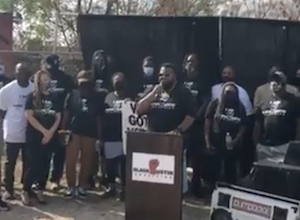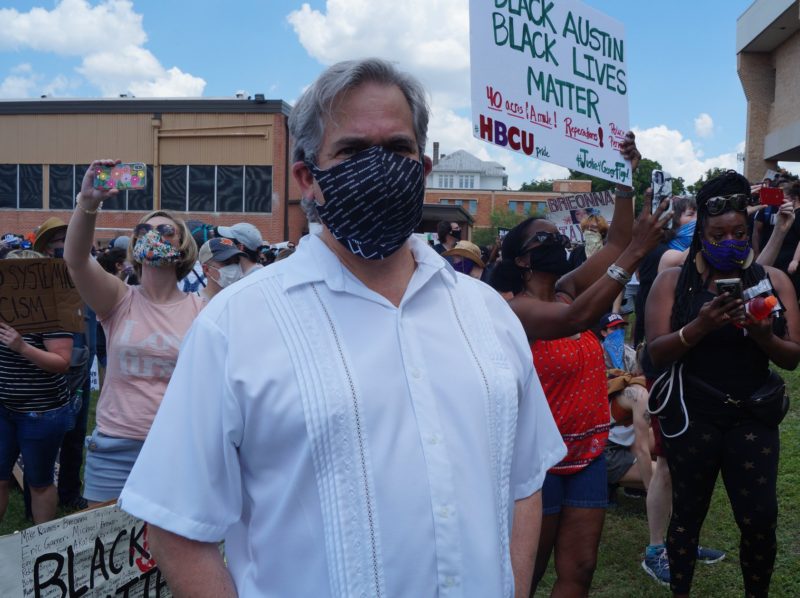A group of African American activists identifying as the ‘Black Austin Coalition’ held a press conference Saturday demanding a minimum of $50 million per year as ‘restitution’ for historical wrongs perpetrated against Blacks in the city.
Demands for slavery reparations have made little headway in Washington DC, but activists have successfully pressured city governments to pay up, including in Asheville, NC, and Evanston, IL.
In Austin’s case, the activists are asking for restitution payments for 20th century wrongs, such as the discriminatory 1928 Master Plan, which wouldn’t preclude them from later pressuring governments for additional reparations for 19th century wrongs, including slavery.
“We have been dehumanized without restitution,” said Donald Dallas, one of the speakers at Saturday’s press conference.
“As we look at historical programs and policies that the city implemented, you will see the underlying mistreatment in why Black districts no longer exist in this city. Systematic racism and official plans like the Negro district of 1928, or I-35 racial barrier, have played a role in the removal of Black success. Developments like Mueller play a role in the migration of certain people. Manipulation of law of the land has been pushed for the expansion of White Austin.”
“They need to give us what they owe us,” said rapper Nook Turner, the coalition’s lead speaker.
Turner said that the group has won the ear of Mayor Steve Adler and Council Member Natasha Harper-Madison, but want to win broader support on the city council for passage of a resolution that would direct money into a fund dedicated to helping Black businesses and nonprofits.
In June, Mayor Steve Adler signed a “commitment to work with the Black Austin Coalition.” In that statement, first reported by KXAN News, Adler said, “I believe there are no civil rights without economic justice and I am committed to exhausting myself doing everything within my power to put money and resources behind achieving that economic justice for African Americans in our community. I want to work with the Black Austin Coalition to do this work…”

That work, as explained by the Coalition leaders Saturday, would involve a minimum payment of $500 million over the next decade. “There will be a Black restitution fund,” Turner said. “And when we say restitution we want you, City of Austin, to give us everything you took from us since 1928. So we are charging the city manager in this resolution to go and do a full analysis and show us economically in current day value what the City of Austin owes Black people.”
“Where’s our money?” one activist shouted repeatedly as Turner spoke.
“The initial dollar amount for the first ten years is $500 million,” Turner said. “Our initial ten-year ask is $500 million. And then once the city manager lets us know how much they actually owe us then we can sit down in the next ten-year period and figure out how they gonna give us the rest of the money.”
The $500 million fund would help establish a “Black Embassy,” which Turner said will “offer A-to-Z every resource that we need as Blacks.” One component of that would be a racial dialogue program. Dr. Kazike Prince, head of the Central Texas Collective for Racial Equity, said that he would be involved in that effort.
“The thing that we’re going to be focusing on is the racial healing. Because, to be honest, you can give me the money, but if there isn’t healing, we can actually create the same problems that we had in the past. So one of the things we’re going to be focusing on is how do we bring that racial healing, how do we focus on atonement, how do we work on restitution,” Prince said.
In his remarks, Turner’s emphasis was more on building up Blacks economically and preserving or restoring what used to be historical Black business districts. “The ultimate goal is for us to build our own district,” Turner said.
The press conference was held in the parking lot of a Black-owned barber shop on 12th Street, where there used to be many Black businesses, but which today have been mostly replaced.
Activists have drafted a resolution and sent it to the mayor’s office, and they said they are scheduled to meet with Adler and D1 Council Member Natasha Harper-Madison on Tuesday.
Turner’s effort is being coordinated with the Austin Justice Coalition, another activist group with influence at the council. AJC leader Chas Moore was meant to speak by video conference at Saturday’s press conference, but in the end he didn’t appear due to technical difficulties.
